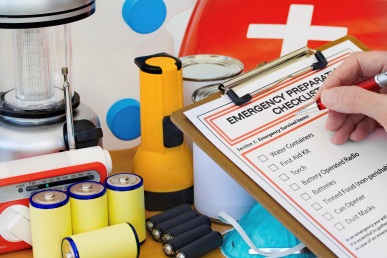AARP Hearing Center

September is National Preparedness Month! Here are five questions to ask yourself when worriso weather is forecast.
If a tornado, hurricane, wildfire, blizzard, flood or severe storm were to threaten your community, would you have what you need — and know what to do — to keep yourself, your home and your loved ones safe?
A little preparation for a day that will hopefully never come can go a long way. Ask yourself the following questions and use your answers as your guide:
1) “ Will I stay or will I go?”
Your place of shelter may vary depending on your location and the expected weather emergency. If a tornado warning has been issued in your community, plan to take shelter in a basement or — if a below ground space isn’t an option — in an interior room on the first floor. In case of a hurricane, wildfire or flood, be familiar with the local evacuation routes, should authorities determine your area is no longer safe. If you don’t have a vehicle of your own, know whom you can call or where you can go for transportation assistance. If you have pets or other domestic animals, do some research in advance about your options for them. Will your pet be able to travel with you? Do you have the right travel equipment for transporting a dog, cat or other creature? Keep in mind that some emergency shelters only accept service animals.
2) “What supplies will I need?”
Whether you shelter in place or evacuate during or after an emergency, you’ll need supplies. Consider what items you’ll need on a daily basis in the event that they’re not available or are in limited supply. (To avoid shopping in the mad rush before the storm, you can gather your supplies long before the worrisome weather is even predicted.) Assemble enough provisions to last for three days at a minimum. Keep one supply at home and a smaller supply in your car or a bag you can take with you if needed. Here are some suggestions:
- Non-perishable food and a non-electric can opener
- Water for drinking and sanitation (one gallon of water per person per day)
- First aid kit
- Battery-powered or hand-crank radio and extra batteries
- Flashlight and extra batteries
- Local maps
- Medical supplies and prescription medications
- Charged cell phone and a charger
- Water and food for your pets or service animal
- Copies of important documents (e.g., your identification plus banking, health and insurance information) placed in a waterproof container
3) “ Will I need special assistance?”
People with certain disabilities or serious medical conditions are especially at risk in an emergency. Some emergency management offices keep registries of people to be located and helped during a crisis event. If you will need assistance — such as to evacuate or deal with a power loss — notify your local emergency management office. Find your local office at fema.gov (type the words “state offices and agencies of emergency management” in the search box).
4) “How will I keep in touch with people, and know what’s happening?”
If you’re away from members of your household when an emergency happens, you’ll need a way to communicate with one another. Keep important phone numbers handy. Identify a place where you and your family can regroup, especially if telephone service (including cell service) is disrupted. Speaking of cell phones, know how to use one. Text messages and emails are often able to get through when voice lines can’t connect. Also, many communities and emergency service preparedness agencies have smartphone apps that issue warnings and updates before, during and after crises. In case all electricity, telephone and Internet service is down, keep a battery powered or crank-operated AM-FM radio on hand.
5) “If the weather causes serious damage, will I have access to my money and mail?
Mail service can be disrupted due to damaging weather. And if you’ve had to evacuate from your home, you simply won’t be around to collect your mail. Since banks may be closed and ATMs could be down or out of money, be sure you have some cash on hand. To protect your finances and ensure receipt of any expected payments, arrange for these funds to be direct deposited into a checking or savings account. Also, most banks offer free online banking services. If you sign up for such a service your bills can be sent directly to your online account, and you can pay those bills directly from your online account. The benefit of the arrangement is that you can manage your finances from wherever you can access the internet (even from your smartphone) and lessen the risk that copies of your documents land in the wrong hands. Learn more about protecting your finances at aarp.org/fraudwatch.
AARP is partnering with the Federal Emergency Management Agency (FEMA) to help educate American families on how to prepare for emergencies and help in physical and emotional recovery when disaster does strike. To learn more about our activities, visit www.aarpfoundation.org/. Be sure as well to take a minute to watch our Preparing for a Disaster video.
You can find other detailed resources at ready.gov, fema.org and redcross.org. For additional home safety information (regardless of the weather) read the AARP Home Fit Guide at aarp.org/homefit.































































